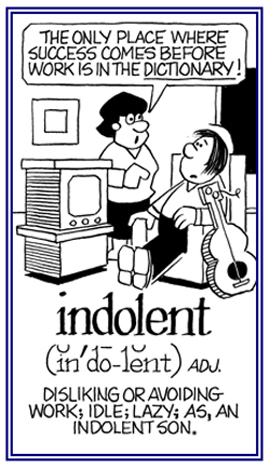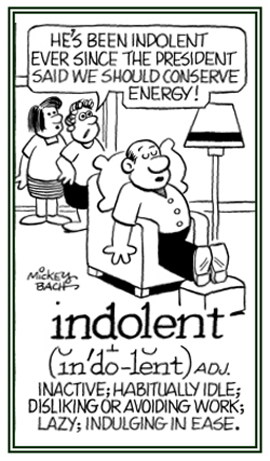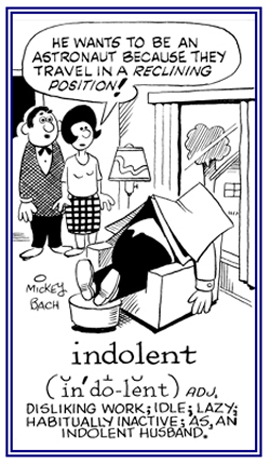doloro-, dolor-, dolori- , dol-
(Latin: to feel pain, to grieve; sorrow, grief, mourning)
Sadness, mournfulness; painfulness: After losing her daughter in the plane crash, Mrs. Small was in a state of dolorousness for a whole year.
Dolors of Mary (noun phrase)
In Roman Catholicism, a devotion that commemorates, "The Seven Sorrows of Mary": Dolors of Mary describes or stands for the seven sorrowful or anxious occasions in her life.
A painful condition of the big toe that is seen in flatfoot deformity: Hallux dolorosus is the pain in the "metatarsophalangeal" joint of the great toe resulting from having a flat foot.
Ille dolet vere, qui sine teste dolet (Latin phrase )
Translation: "He mourns honestly who mourns without witnesses." -Martialis
1. A dislike of work; laziness; idleness: Adam passed his days in indolence just sleeping late and sunbathing at the beach.
2. Etymology: from Latin indolentia, "freedom from pain"; from Latin in, "not" + dolere, "to suffer pain".
2. Etymology: from Latin indolentia, "freedom from pain"; from Latin in, "not" + dolere, "to suffer pain".
indolent (adjective), more indolent, most indolent
1. In medicine, referring to something which causes little or no pain, such as a tumor: Many people have high blood pressure, which is an indolent disorder in the body which can be very dangerous just because it doesn’t hurt and is, at first, not noticeable.
2. Pertaining to the slowness to heal, to grow, or to develop, for example, an ulcer or a wound that heals very slowly: Sometimes cancer can be a very indolent condition which often causes it to be discovered quite late in its development and too late to cure.
3. Relating to the fact of being disinclined to exert oneself; habitually lazy: Little Timmy was an indolent child, being so sluggish and listless that his parents thought he was sick.
4. Characteristic of a person who dislikes work; lethargic; idle: Gregory was an indolent young man who loathed and shunned any kind of exertion or physical activity and as a result, he refused to go to a fitness studio to improve his physical situation.

© ALL rights are reserved.


© ALL rights are reserved.
Go to this Word A Day Revisited Index
2. Pertaining to the slowness to heal, to grow, or to develop, for example, an ulcer or a wound that heals very slowly: Sometimes cancer can be a very indolent condition which often causes it to be discovered quite late in its development and too late to cure.
3. Relating to the fact of being disinclined to exert oneself; habitually lazy: Little Timmy was an indolent child, being so sluggish and listless that his parents thought he was sick.
4. Characteristic of a person who dislikes work; lethargic; idle: Gregory was an indolent young man who loathed and shunned any kind of exertion or physical activity and as a result, he refused to go to a fitness studio to improve his physical situation.



Go to this Word A Day Revisited Index
so you can see more of Mickey Bach's cartoons.
indolently (adverb), more indolently, most indolently
Referring to how an inactive condition may linger longer, but often slowly progresses to a more advanced stage: Clive used to live indolently with his cousins until they turned him out!
Si vis me flere dolendum est primum ipsi tibi. (Latin quotation)
Translation: "If you wish me to weep, you yourself must first feel grief."
Horace, in Ars Poetica, explaining to writers that emotion must be felt in order to be conveyed successfully in words.
tabes dolorosa (Latin noun) (no pl)
Tabes dorasalis in which pain is the dominating feature: Tabes dolorosa can be explained as the pain involved in the emaciation or wasting away of the the back.
uncondolatory (adjective) (not comparable)
Concerning the lack of expressing pity or compassion; communicating severity or pitilessness: Tom uttered very uncondolatory comments to his sister regarding the loss of her husband which was totally unacceptable and rude.
via dolorosa (vee" uh doh" luh ROH suh; vigh" uh doh" luh ROH suh) (proper noun)
1. The road of pain, sadness, or sorrow: The Via Dolorosa was the road that Jesus followed on the way to His crucifixion, therefore a succession of painful experiences one may go through for the benefit of others.
2. A distressing or painful journey or process: The severe winter made traveling and living via dolorosa for many people.
3. A difficult course or experience: The lexicographer was proceeding via dolorosa in his efforts to improve and to revolutionize the contents of his on-line dictionary for the users of the world. 4. Etymology: from Latin via dolorosa; literally, "painful path" or "painful way"; Latin via, "road" + dolorosa, "sorrowful".
2. A distressing or painful journey or process: The severe winter made traveling and living via dolorosa for many people.
3. A difficult course or experience: The lexicographer was proceeding via dolorosa in his efforts to improve and to revolutionize the contents of his on-line dictionary for the users of the world. 4. Etymology: from Latin via dolorosa; literally, "painful path" or "painful way"; Latin via, "road" + dolorosa, "sorrowful".

